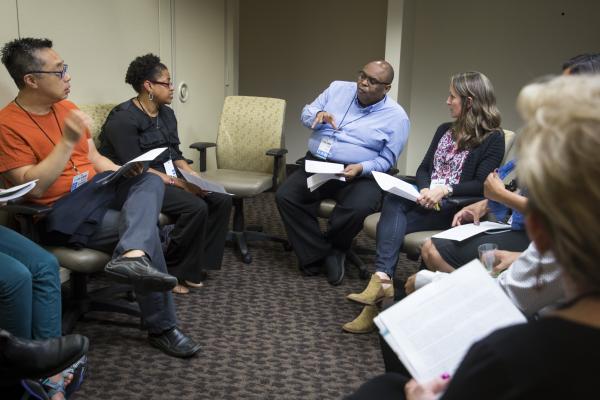Editor’s Note: The Summit: World Change Through Faith and Justice is one of the powerful opportunities Sojourners has as an organization to bring together 300+ of our leaders together to deepen relationships and build more intersectional movements. The following series of posts offer reflections from participants to offer a glimpse of the experience. We are grateful for the ways you make this gathering possible. Our first reflection comes from JoAnn Flett, director of Eastern University's MBA in Economic Development and the facilitator the Summit’s 2017 Business Convening.
Conversations have the power to shape our identity and our point of view. For that reason, I was delighted to participate in The Summit: World Change Through Faith and Justice, which offered a chance for conversations around five important themes: Story, Truth, Resistance, Disruption, and Healing. I found the conversations thoughtful, engaging, and profound, and was struck by how many attendees were trying to creatively imagine solutions to intractable, complex social problems.
Alongside the core conversations that reflected these themes, I appreciated the robust conversations on the role of business in society through The Summit’s “Just Business” track. Participants were encouraged to investigate the possibilities of business as a medium for building the Kingdom of God.
During the Business salon session, titled “The Role of Just Business Driving a Just Economy,” Alfa Demmellash, CEO and Co-Founder of Rising Tide Capital (RTC), Kesha Cash, Founder and Principal of Impact America Fund (IAF), and Jay Coen Gilbert, Co-founder of B-Lab, discussed the value of rethinking and reimagining the role of business in society. These organizations are promoting justice in society and using business as a means to restore communities. At both RTC and IAF, investment capital supported entrepreneurs in low-income and marginalized communities by providing access to capital, business education, and networking services that engendered insightful entrepreneurial support. Moreover, B-Lab, the certifying organization for B-Corporations, is working to build a movement of entrepreneurs who are using “business as a force for good.”
Notably these leaders displayed diversity in thought and experience, but also along racial and gender lines. In fact, this was the most diverse panel in those regards I have experienced at a conference or gathering on business.
Participants were reminded that the word “economics” is a derivative of the Greek word “Oikonomia,” meaning household management. The conversation queried how faith could inform business as service to others? What kind(s) of a theological vision/values of business ought we to pursue as a faith community? Which communication medium would assist in facilitating, collaborating and connecting the varied conversations on faith and business?
During the Business Convening (learn more about the purpose of convenings at The Summit here), participants attempted to describe the hermeneutical task of economics. Simply stated there is to be meaningful engagement with economics to better understand the biblical meaning/interpretation of economics.
Participants discussed the need for faith and business leaders to depict a moral vision for employees, customers, investors, community, and the environment. They affirmed the church’s role in providing a moral vision for business. Indeed, many of the participants asserted that this is an important task of the church’s work. Church leadership is necessary in articulating a vision for using business as a tool to build a just society. Subsequently a common language is needed in order to engage and interpret the many conversations on the topic. Significantly, the conversation must include marginalized and vulnerable groups in communities.
Toward this end the Convening participants offered the following commitments to pursue over the next year:
- Create a working group to continue the conversations, through an Eastern University platform
- Share invitations to these conversations happening throughout this next year
- Incorporate the business lens into the plenary sessions at The Summit 2018
- Each participant identify 2-3 leaders who should be involved in The Summit 2018
The Summit offers an important conversation space for people of faith to define the role of just business in a just economy. I am hopeful that the conversation will continue over the next year, as together we can articulate a moral vision of business/economics that results in justice.
If you would like to participate in these business-related conversations, either at The Summit or in other spaces throughout the year, we are excited to hear from you. Please contact Kaitlin Hasseler to learn/engage more.
Got something to say about what you're reading? We value your feedback!

